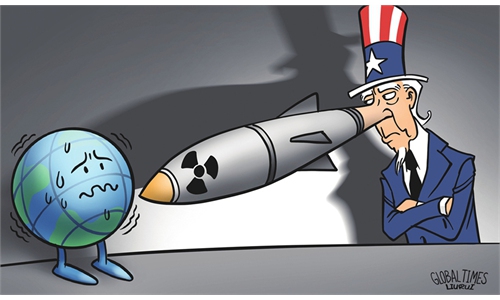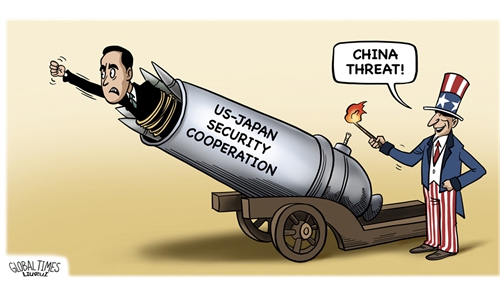
Illustration: Liu Xidan/GT
The US Department of Defense plans to refurbish intercontinental ballistic missile (ICBM) silos "that give it the ability to end civilization," as stated in an article titled "The Pentagon Wants to Spend $141 Billion on a Doomsday Machine" on US magazine WIRED.
As the article points out, despite the Pentagon's cost overruns, it remains committed to developing land-based ICBMs, and for the millions of Americans living within range of the 450 ICBM silos, this means they have been designated by the Pentagon as "acceptable casualties."
The main idea could be modernizing everything from silo hardware to command-and-control software, ensuring that military branches responsible for maintenance, along with contractors closely tied to the Department of Defense, can achieve sustainable and stable income from the project. Over the next decade, the goal is to keep this project running sustainably.
In 2023, an AP report revealed that this $96 billion renovation plan involves 450 ICBM silos across five states, their control centers, three nuclear missile bases and several other testing facilities. The budget increased from $96 billion to $141 billion in less than a year reflects the need to satisfy all stakeholders.
The likely distribution of tasks is as follows: Lockheed Martin will handle structural upgrades and security enhancements of the silos, and update parts of the electronic and communication systems to improve overall response speed and operational reliability. Northrop Grumman will focus on technical improvements and modernization upgrades of the missile systems, including optimization of the missile launch control systems and navigation systems. Boeing will update and maintain the mechanical equipment of the silos, including upgrading and optimizing the launch platforms. Raytheon will upgrade the communication systems, including the application of encrypted communication and anti-jamming technologies, and participate in the research and implementation of electronic warfare protection measures to ensure the survivability of the silos if they come under electronic attack. As is customary with projects involving these four US defense contractors, cost overruns, delays and a high probability of failure and subsequent rework are expected outcomes.
Of course, the US Department of Defense must justify and be transparent about this renovation project. It cannot tell Congress that it is simply about redistributing benefits. The best justification is China.
Thus, the Pentagon has constructed a rationale focused on the concept of extended nuclear deterrence. In the Asia-Pacific region, the project could convey the message of extended nuclear deterrence to Japan and South Korea. By connecting the situation in the Russia-Ukraine conflict, it constructs a new narrative that the US needs to modernize its land-based ICBM systems to strengthen deterrence credibility. This encourages Japan and South Korea to emulate Ukraine by provoking and challenging neighboring countries on security issues, helping the US maintain its hegemony. It also provides a policy justification for the renovation of the US' outdated land-based ICBM silos, arguing that the US needs to modernize its ICBM systems to maintain deterrence credibility in light of potential retaliatory threats to these countries.
Essentially, driven by profit, the US Department of Defense and the military-industrial complex are willing to go to lengths that could destabilize global security. This alarming trend demands serious attention and vigilance.
This behavior of profiteering death merchants has also faced opposition within the US. The US overly relies on land-based ICBMs. This is rooted in its aggressive nuclear strategy of first-use nuclear weapons. This strategy is unsustainable and unaffordable for the US.
Other experts and policy analysts have also pointed out that strategic planning driven by the profits will lead to an arms race and the US' own security predicament. If the US genuinely cares about national security, it must fundamentally reject the flawed hegemonic security perceptions and construct a more constructive national and international strategy through cooperative means to achieve its strategic goals.
Overall, whether during the US-Soviet Cold War arms race or the international developments since the Cold War's end to the present day, it's evident that a hegemon like the US cannot achieve significant accomplishments merely by refurbishing 450 ICBM silos. All the program does is enables contractors to meet their profit targets. History repeatedly proves that militarism, rather than self-transcendence and reform, is always the main reason why hegemonic countries decline and collapse, and the US will be no exception.
The author is director of the Research Institution for Global Cyberspace Governance at Fudan University. opinion@globaltimes.com.cn



